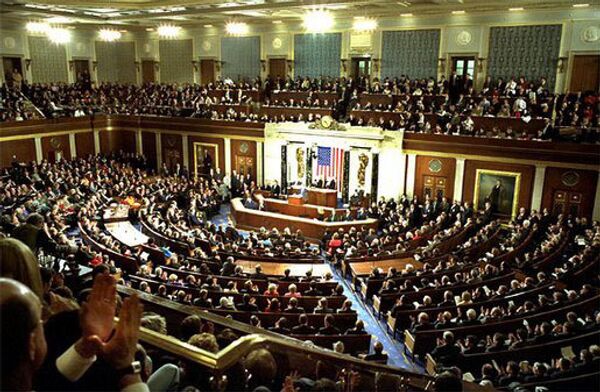After the drubbing Democrats received at the polls on Nov. 2, President Barack Obama may find it much harder to deliver on his promise to reset his country's relationship with Russia.
Republicans took control of the House of Representatives and gained six seats in the Senate in the recent election, giving Democrats a slim 53-47 majority. Like all treaties, the New START Treaty, signed by Obama and Medvedev in April to further cut their countries' nuclear arsenals, must be approved by two-thirds of the Senate in order to be ratified. If it fails to get through the current, lame-duck Senate, in which Democrats still maintain their 59-41 seat advantage, the treaty will have to be put to a vote after January 3, when the six newly elected Republican Senators officially take office. This is going to be a race against time for the Obama administration.
The Magic Number
President Obama will have to secure the support of at least eight Senate Republicans if he wants to see the New START Treaty ratified before the year's end. If he fails, he will have to win over a full 14 Republican Senators in the new Congress to reach the magic number of 67. Time is running out for Obama, and in his efforts to push the landmark treaty through, he has already laid all his cards on the table, agreeing to Republican demands for additional funding to upgrade the U.S. nuclear arsenal.
In theory, New START should not be a hard sell, especially since the Senate Foreign Relations Committee approved a resolution in September to ratify the arms reduction treaty with Russia.
Obama's strongest argument is that failure to ratify the treaty would undermine national security by further delaying the return of U.S. inspectors to Russian nuclear sites. No inspectors have been on the ground since last December, when the former START treaty expired.
The prospects of ratification are also boosted by the fact that lame-duck Senators, who no longer have to worry about reelection, tend to vote their conscience, so Obama may have to do less deal making to get the treaty through.
The odds that the treaty will be ratified before the end of the year are about 50/50. To improve its chances, the White House has added another $4.1 billion to the $80 billion already pledged to modernize the U.S. nuclear arsenal over the next ten years. This funding is contingent on ratification of the treaty.
In practice, however, Obama's goal may prove quite hard to achieve, as there is much more than the ratification of New START at stake.
Is a reset possible without a New START?
The New START Treaty is a major element of Obama's reset with Moscow, but it has eclipsed other important elements.
For some reason, both Russia and the United States act as if the entire reset policy depends on ratification of New START. But in fact, the rest is something much larger and much more significant. The post-Bush normalization in U.S.-Russian relations goes far beyond nuclear arms reductions. It involves Russia's accession to the World Trade Organization and Obama's stated intention to extend a pact on nuclear energy cooperation, which was signed when George W. Bush was still in office. To secure Russia's WTO membership, Obama will need to persuade the Republicans to scrap the Jackson-Vanik amendment, which was passed in 1974. The amendment imposed restrictions on trade with the Soviet Union to pressure that country to relax its harsh emigration policies.
Thus, New START is just one of the three pillars of Obama's reset, and probably the easiest to sell to Congress.
Already, Obama's advisors are nervous that the Republicans may tie ratification of New START to repeal of Jackson-Vanik, using this leverage to demand that changes be made to the arms reduction treaty.
President Obama is making every argument in favor of ratification in the hopes of pressuring the Senate to act. Obama has warned that Russia could further limit the amount of supplies it allows to pass through its territory en route to Afghanistan. Russia could also withdraw its tenuous support of the UN sanctions against Iran. The sanctions have already resulted in a $13 billion loss for Russia, which had contracts to sell S-300 missiles to Iran. Worst of all, Russian President Dmitry Medvedev, whom Obama sees as a champion of democracy, would stand fewer chances of winning reelection.
The views expressed in this article are the author's and do not necessarily represent those of RIA Novosti.



